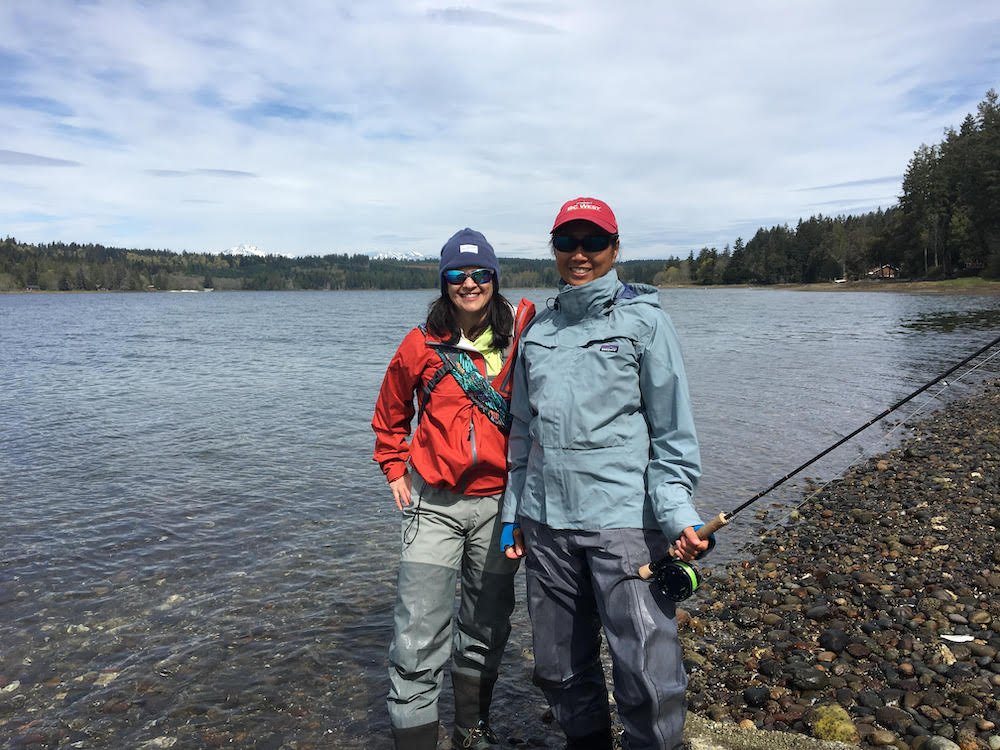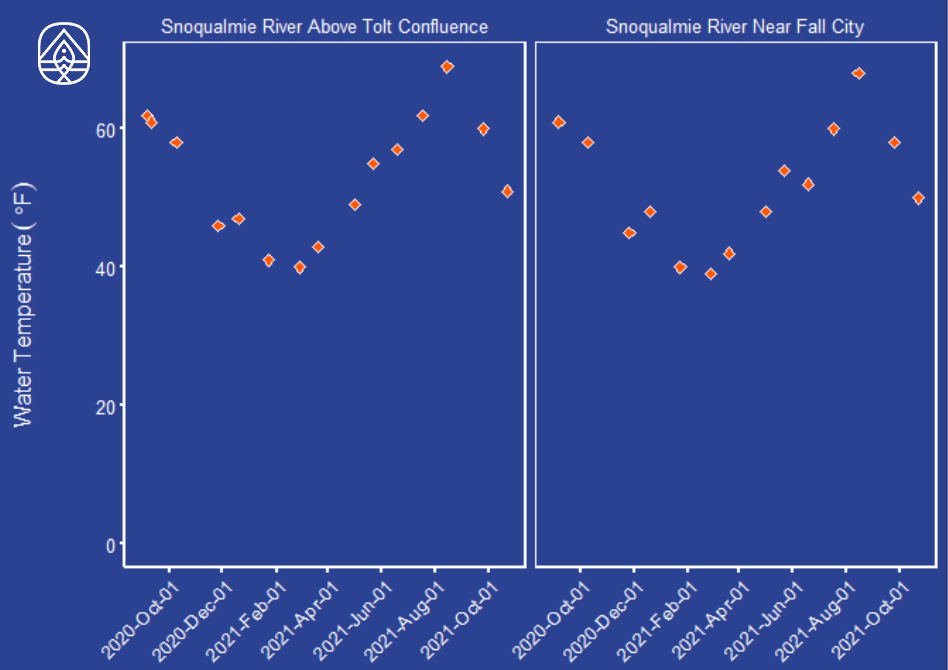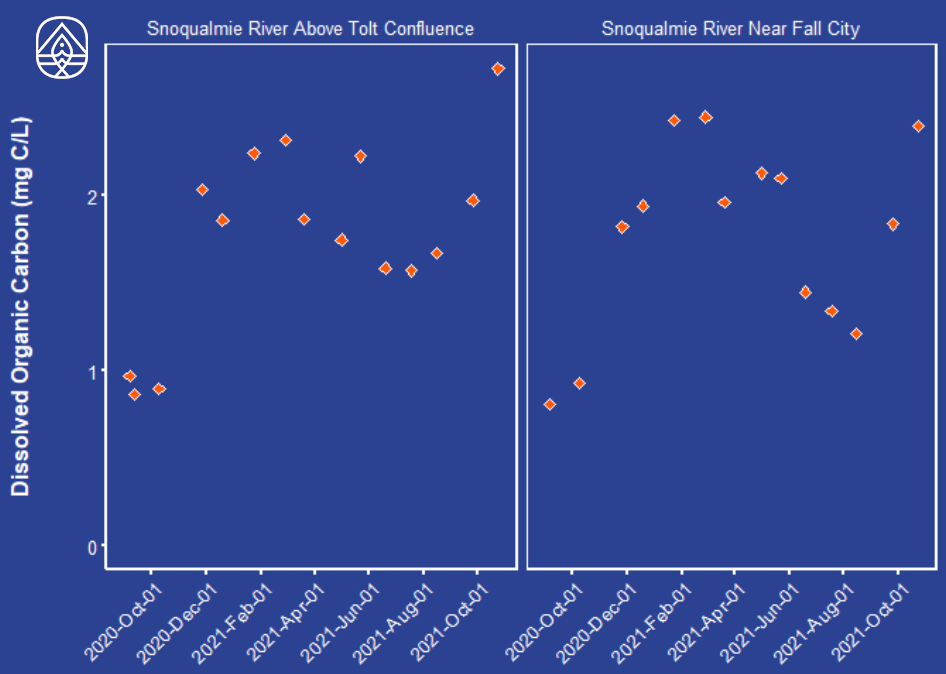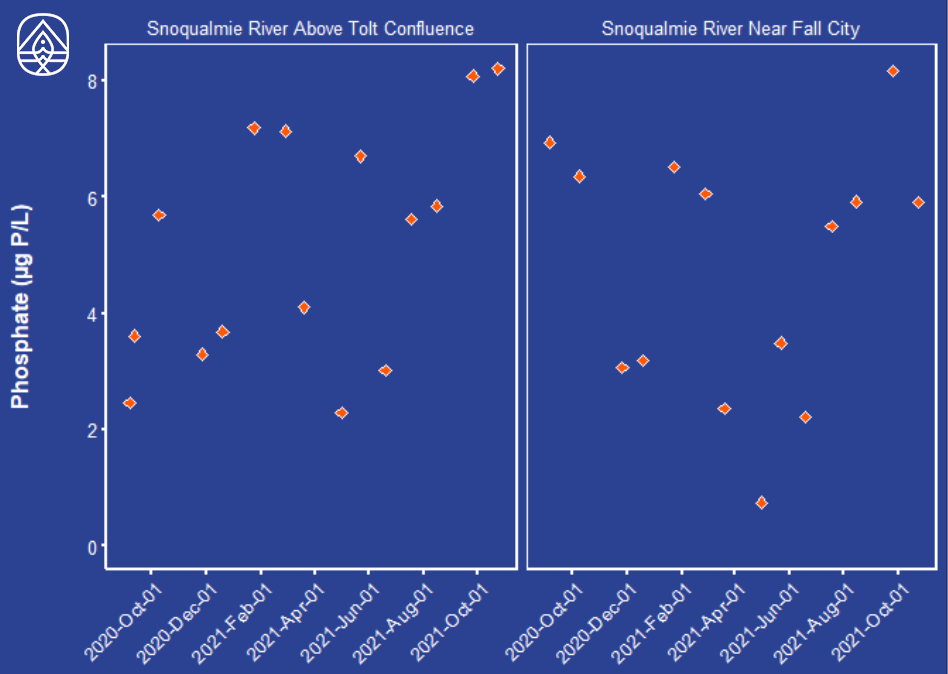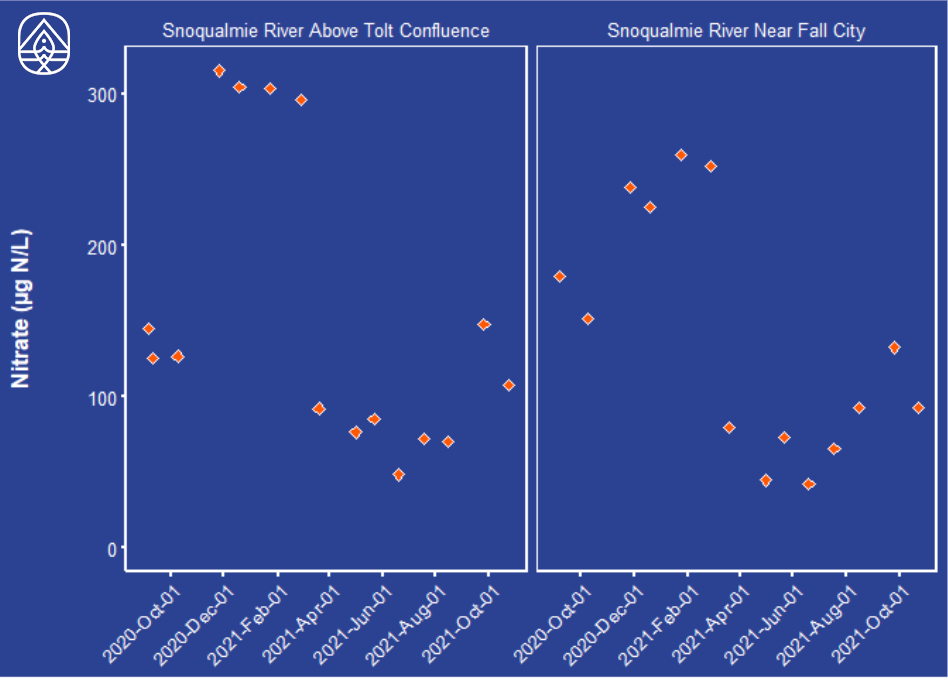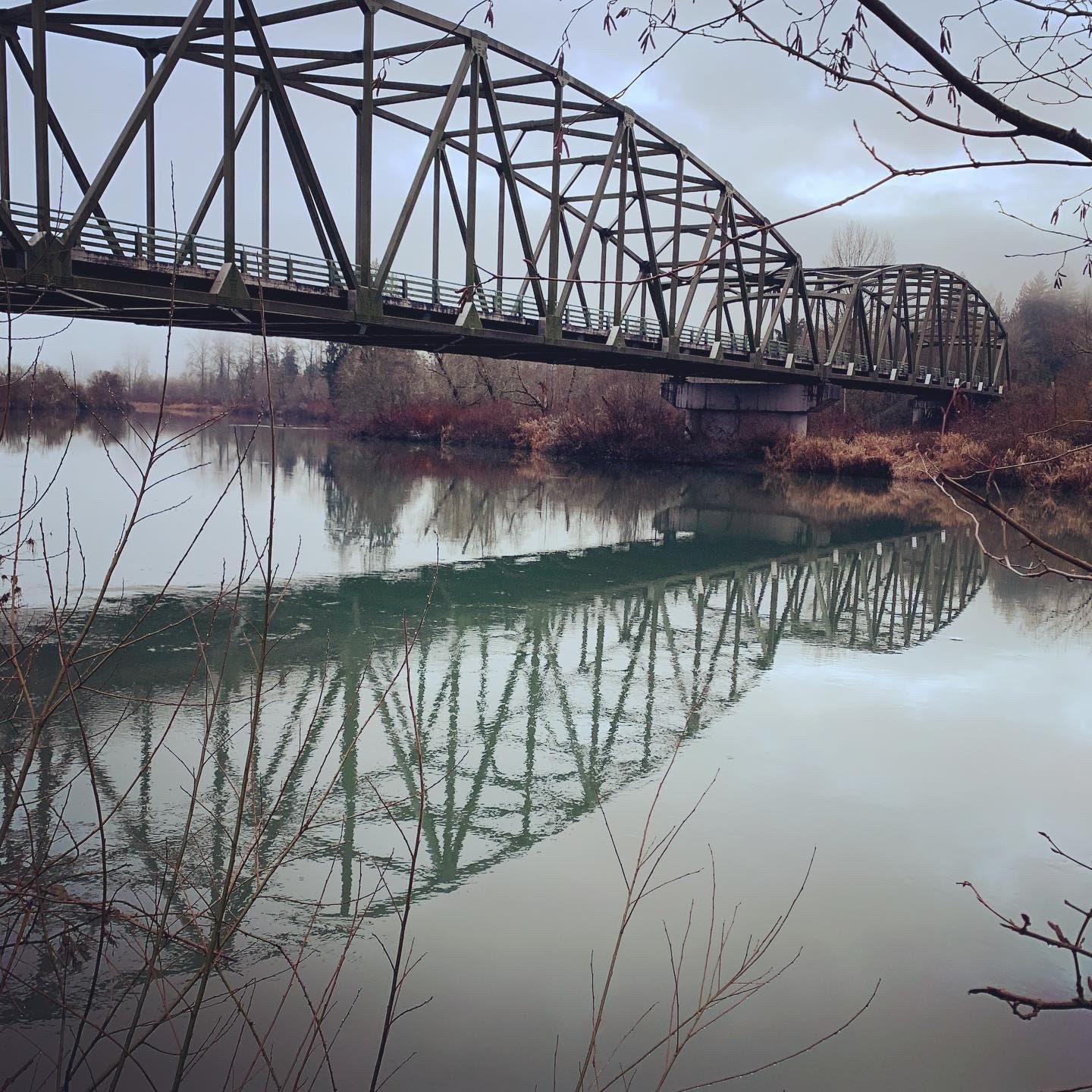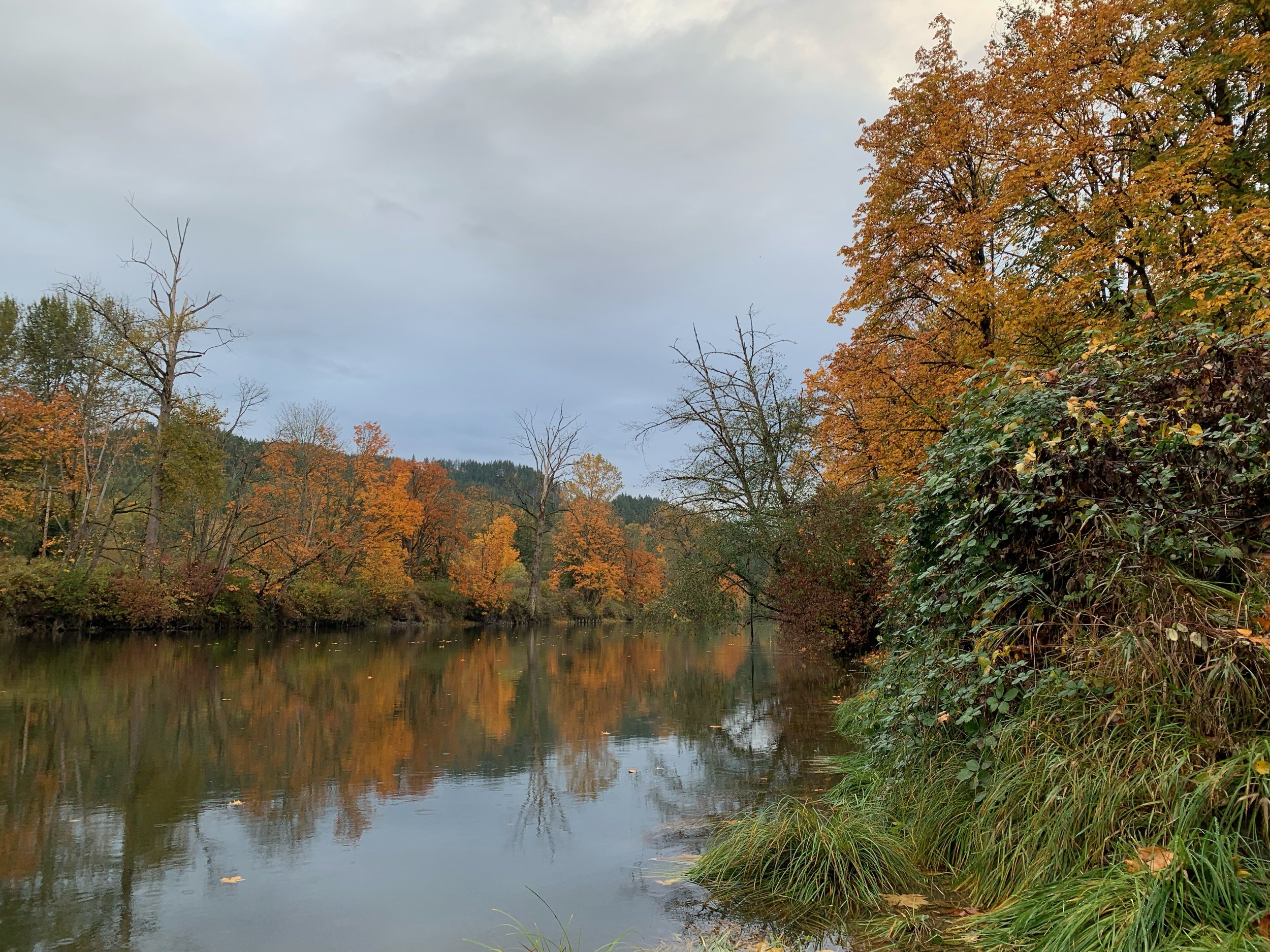Featured Volunteer: Susan Clementson
Susan Clementson, left, samples the fishing on a local river in Washington.
Susan Clementson began sampling for Science on the Fly in September of 2020. Since then, she has collected samples monthly on the Snoqualmie River in Washington. Susan lives in Kirkland, WA with her partner Jose and their two dogs, where she has worked in trade compliance (import/export) for more than 30 years. When not working, Susan frequently bike packs, backpacks, day hikes, snow shoes, skis, and trail runs. As she put it, Susan likes to do “whatever gets me outside!” While relatively new to fly-fishing, Susan’s passion for her local watershed is lifelong, and both sampling and fishing have provided her with unique opportunities to reconnect with the land.
Above, nutrient concentrations and temperature readings from Susan’s analyzed samples from October 1, 2020 through October 1, 2021 are displayed. Sampling data from Susan and other volunteers can be reviewed on our public data sheet, and relative concentrations of nitrate, phosphate, and dissolved organic carbon are available on our interactive maps.
What is your story? Where did your passion for climate-friendliness and protecting your watershed come from?
While I am not active in the tribe, my heritage as a Native American seems to drive the feeling of service to the land. It’s important to pay attention and protect our air, water and land. It’s also shocking to see islands covered by rising water, glaciers melting and places I have visited or want to visit simply disappearing off the map.
What is your fly fishing background? Since you started fly fishing, or fishing, have you noticed any changes in your watershed/fishery?
I grew up fishing with my brother but only started fishing a few years ago. I got into fly fishing around 5 years ago. I like the adventure of it, finding and walking water, seeing seams and learning to read water. I like figuring out what bugs are around and trying to find flies to match the hatch. I also believe it’s a great way to add a purpose to hikes, packing trips and camping.
I love learning how the water ebbs and flows and how temperatures are changing with the seasons. The process is making me feel more connected to the water and more invested in its health.
What is in your 'backyard'? What is your local watershed/river and what significance does it have for your local economy?
The Snoqualmie River is nearby and that’s where I sample for Science on the Fly. Mostly this river is lined with farms. In addition to fishing there are also guided raft trips and a fancy hotel on the falls.
Science on the Fly sampling site at the confluence of the Snoqualmie River in Washington
Why do you feel it is important to contribute to the research of your watershed health? What is this research going to tell us about our future and the actionable steps that are needed?
Clean and healthy water isn’t something that we can assume going forward. Protecting our waterways is a key part of the health of our planet. I hope in testing, that we can identify any potential issues with the river. I would hope that if we do identify increases in chemical levels or unexplained temperature increases we can work with local environmental groups to find the cause and correct it.
How can we inspire more people to give a damn about protecting our rivers and enforcing policies focused on watershed health and/or climate change? What is its importance to you?
Education and participation in projects like these can make people more aware of their impact. I like that my city puts out notices about our creeks and waterways. When the beach down the road is closed, they educate on why bacteria levels are high. I think that helps people understand that their actions matter and that they can take steps to mitigate it.
Specific to the river I test on, it really makes me think about farming and the impact it has on the river and watershed. I think a lot about how hard (but necessary) it is to farm, and how using environmentally friendly methods could help. I haven’t yet figured out how to concretely take action on that but I hope at some point in the future to better understand the impacts, the challenges, and to help farmers somehow reduce their impact in some way.
What excites you the most about being a volunteer for Science on the Fly?
Oddly I haven’t actually fished this river, but working towards understanding it’s health makes me much more aware of climate change and protecting our water. I hope at some point to be able to take some specific action to support change in my region.
I love getting out on the water every month and seeing the changes in the testing sites. Hot summer day, ice on the river banks, fall leaves floating by. Rain or shine this has made getting out to the water a priority that it has never been. Funny because my tribe is known as “People of the water.” I love taking some definitive step towards protecting her. Thanks for all you do and this opportunity!
Science on the Fly sampling site at Fall City on the Snoqualmie River in Washington
